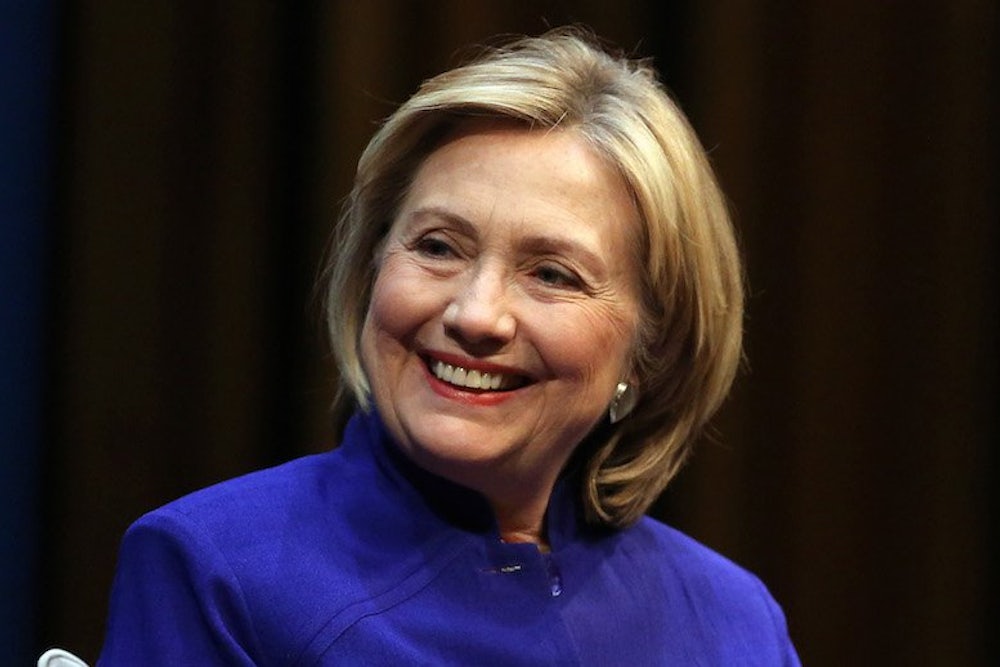In the run-up to her likely presidential campaign, Hillary Clinton has assured top environmental groups like the League of Conservation Voters that she is committed to their causes. So why aren’t oil industry representatives worried?
Erik Milito, the American Petroleum Institute’s (API) Director of Upstream and Industry Operations, told conservatives last week at the Conservative Political Action Conference (CPAC) that Clinton could be "better" on oil and gas than the current president.
“We hope no matter who's in there it's better than what we have there now, because it's been nothing but barrier after barrier of delay,” Milito said during a presentation on the natural gas boom in America. “President Clinton, he actually signed a positive piece of legislation—the Deepwater Relief Act. All of this development on the deepwater in the Gulf of Mexico is because of the alliance he had with the Louisiana delegation. It’s hard to speculate where Hillary will be different.”
Both sides think Clinton could be an ally. The reason: her mixed record on energy issues, like natural gas and the Keystone XL pipeline. For example, Clinton might be the only politician in the country who has steadfastly refused to take any position on the pipeline. However, she was in Canada the same day the Senate debated legislation to approve Keystone and suggested in 2010 that she was “inclined” to approve TransCanada’s Keystone permit application.
As Secretary of State, Clinton championed hydraulic fracturing, a controversial drilling process that injects water and chemicals underground to extract oil and gas from rock. According to a report from Mother Jones, Clinton advocated for natural gas as “the cleanest fossil fuel available” and hired a former oil industry representative to push fracking abroad. She didn't acknowledge the environmental problems fracking and its wastewater cause, including increasing greenhouse gas emissions, contaminating drinking water, and causing minor earthquakes.
All this has made environmentalists careful when talking about Clinton. Grassroots groups like 350.org and Friends of the Earth say they could organize protests targeting Clinton’s climate commitment, if the need arises. The larger green groups tend not to publicly comment on Clinton’s mixed record, though representatives have privately expressed reservations to me in the past.
API’s Milito did name one reservation he had about Clinton. She’s hired Obama’s senior advisor, John Podesta, to chair her campaign. "[Podesta] is not someone who's generally shown to be supportive of the policies of oil and gas industry,” Milito said.
That's an understatement. Until he left the White House in February, Podesta was the strategist behind many of the president’s climate change initiatives. He saw the political rollout of the White House's first comprehensive strategy to reduce methane emissions in natural gas and curb carbon pollution from power plants. Podesta also helped broker a breakthrough climate deal with China last fall.
The oil industry may not have mobilized against Clinton just yet, but they already have strong opinions on Podesta. His “legacy will be the creation of a regulatory and political strategy to address greenhouse gas emissions that, following the collapse of legislation, opened up multiple fronts of attack on the fossil-fuel industry,” Stephen Brown, vice president of government relations for the Tesoro oil refinery, told the Washington Post last month.
Environmentalists can cheer Podesta’s place in Clinton’s campaign for the same reason oil industry representatives can condemn it. Perhaps Hillary will be an environmentalist candidate, after all. Or perhaps Big Oil will get their way. Either way, there's a lot at stake.
